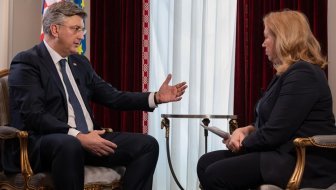The European Parliament Foreign Affairs Committee will vote on two documents important for Croatia on Thursday -- a draft resolution on the Accession Treaty and a draft resolution on Croatia's EU membership application.
The Accession Treaty cannot be signed without the approval of the European Parliament. After adoption by the Committee, the document will be put to the vote at a plenary session of the European Parliament on November 30 or December 1.
After the European Parliament gives its consent, the Accession Treaty is to be approved by the Council of the EU, which meets on December 5. The Treaty is to be signed on December 9, before a summit of the heads of state or government of the 27 EU member states when Croatia will for the first time attend a meeting of the European Council as an observer.
Members of the European Parliament put forward 113 amendments to the draft resolution on Croatia, which was drawn up by the parliamentary Rapporteur on Croatia, Hannes Swoboda.
In the draft resolution on Croatia's EU membership application, the European Parliament welcomed the conclusion of the accession negotiations with Croatia, saying that they "have significantly altered the country's socio-political, economic and cultural landscape," and stressed the need to keep up the reform momentum because "this process is not complete but should continue with the same vigour and hard work after the conclusion of negotiations and beyond accession."
MEPs expressed their conviction that the positive results of the reform process would strengthen the support and trust of Croatian citizens in EU membership, calling on the citizens to vote in favour of EU entry in the referendum and the member states to complete the ratification process in time. They said they would follow the pre-accession monitoring process and called on the Commission to keep them regularly informed of the extent to which Croatia was honouring its commitments.
The draft resolution urges Croatia to continue combating corruption, "particularly high-level corruption," in the judiciary, law-enforcement agencies, public administration and state enterprises.
Croatia is invited to step up efforts to prosecute war crimes, implement a new strategy on impunity, and deal with cases in which victims are ethnic Serbs and perpetrators members of Croatian security forces.
Croatia is encouraged to continue its full cooperation with the UN war crimes tribunal in The Hague (ICTY) and to continue cooperating with Serbia in judicial matters, notably in the handling of war crimes.
Croatia will be urged to encourage in the best possible way the return of refugees and displaced persons and to improve working and living conditions for Serb returnees.
MEPs encourage the Croatian authorities to continue their efforts to promote tolerance and combat all forms of discrimination, hate speech and intolerance against ethnic and sexual minorities.
The European Parliament calls on the Croatian government to address the structural weaknesses of the economy, stimulate employment by reviving the labour market and pursue fiscal consolidation in order to boost competitiveness. The economic recovery should be accompanied by ecological modernisation, higher energy efficiency and the use of renewable energy sources.
MEPs encourage the government to improve the business environment, pay special attention to small and medium enterprises, and continue the reform of the welfare system in order to ensure the sustainability of public finance.
The EU member states are invited to apply the transitional provisions on the employment of Croatian workers only based on factual information and in situations of serious disruptions in national labour markets.
During the accession negotiations, it was agreed that the member states could impose a temporary ban on the employment of Croatian nationals for up to seven years. The same solution was agreed in the two previous EU enlargement rounds. Croatia, too, has the right to impose reciprocal measures and ban the employment of citizens of the countries that have banned the employment of Croatian nationals.
Croatia is urged to settle its outstanding issues with some of its neighbours, especially those regarding border demarcation, missing persons, property restitution and refugees.
The European Parliament "strongly believes that open issues of a bilateral nature must not halt the process of EU accession of candidate and potential candidate country in the Western Balkans" and welcomes the declaration on this matter which the Croatian Parliament adopted on 21 October 2011.
































